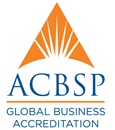Program Overview
Return to the School of Business and Management Homepage
The Master of Business Administration (MBA) degree is a relevant and rigorous graduate degree program that prepares individuals for leadership roles in firms and organizations where they are expected to add value to those enterprises. The courses are offered entirely online in 8-week formats, with some courses requiring periodic (maximum of two times per term) “live” participation, which can be conducted from a distance.
The MBA degree is a globally recognized credential in the business community and students will take courses that prepare them for high demand professions. Students may blend 21 credits of core material with a variety of electives in topics of interest, or they may choose one of six areas of study: Accounting, Data Analytics, Finance, Healthcare Management, Human Resource Management, or Marketing. It is not necessary to select an area of study prior to admission or even prior to completing the core. The curriculum of an MBA program is typically more quantitative in orientation than a management or leadership curriculum.
In order to prepare students for the more analytically demanding degree program, students are required to satisfy prerequisite course work prior to enrolling, but not prior to applying for admission. Students may enroll in the Graduate Business Degree Preparatory Program. The program covers the prerequisite three courses, which are noncredit. Students admitted to the program are required to complete three undergraduate courses or receive a score of 80 percent or better on approved qualifying exams (TECEP® or CLEP®) in the following subject areas: financial accounting, statistics, and microeconomics. Courses in these areas taken at Thomas Edison State University or elsewhere are approved as long as they were taken at an institutionally accredited institution recognized under the TESU Transfer Credit Policy and Guidelines, were completed within the last seven years, and in which the student received a grade of B or better. Students who have a CPA license or have passed levels I and II of the CFA examination will be exempt from the financial accounting requirement.
Areas of Study
Students must take a total of 18 credits in one or more of these areas to satisfy the degree requirement. Students may select any combination of electives or select one of the following areas of study:
Students selecting an area of study must complete all course work listed under the area of study designation and have the option of satisfying a portion of the course work in the area of study with prior learning assessment (PLA).
Students may also apply graduate business certificates such as Hospitality Management, Human Resource Management, International Business Finance, Organizational Leadership, and Project Management.
Download our Degree Program Profile Sheet for an overview of our MBA program.

The MBA program is accredited by the Accreditation Council for Business Schools and Programs (ACBSP).
Program Timeline
This is a hypothetical timeline that shows how a student can complete the Master of Business Administration degree program at Thomas Edison State University in about 15 months.
To demonstrate how you could progress through the program over a 15-month period, we are using the January term as the student's first term and move through the program during the six MBA terms offered each year. Each term is 8 weeks.
The timeline is informational in nature and does not represent an actual program plan. Enrolled graduate students work with our deans and academic advisors to develop a program plan that maps out how students will complete their degree and whether they can transfer previously earned graduate credits or earn graduate credit for what they know through prior learning assessment.
| Term (runs for 8 weeks) |
Courses to Take |
Credits |
|
First Graduate Term:
Starts beginning of January
|
ETM-7500: Ethics for Managers
MBA Elective/Area of Study
|
3
3
|
|
Second Graduate Term:
Starts beginning of March
|
FIN-7100: Financial Management
MKM-7000: Marketing Management
|
3
3
|
|
Third Graduate Term:
Starts beginning of May
|
MBA Elective/Area of Study
MBA Elective/Area of Study
|
3
3
|
|
Fourth Graduate Term:
Starts beginning of July
|
SOP-7200: Strategic Operations Management
GSM-7300: Global Strategic Management
|
3
3
|
|
Fifth Graduate Term:
Starts beginning of September
|
MBA Elective/Area of Study
MBA Elective/Area of Study
|
3
3
|
|
Sixth Graduate Term:
Starts beginning of November
|
MBA Elective/Area of Study
ORR-7100: Organizational Research
(must be taken prior to Capstone)
|
3
3
|
|
Seventh Graduate Term:
Starts beginning of January
|
MBA-7300: Management Capstone
|
3
|
NOTE: ORR-7100: Organizational Research must be taken prior to the MBA-7300: Management Capstone. Students cannot take them in the same term. Students can contact an academic advisor to register for both courses.
This timeline includes MBA courses only and does not include any prerequisite courses an applicant may need to take prior to being admitted into the MBA program such as those offered in the Graduate Business Preparatory Program.